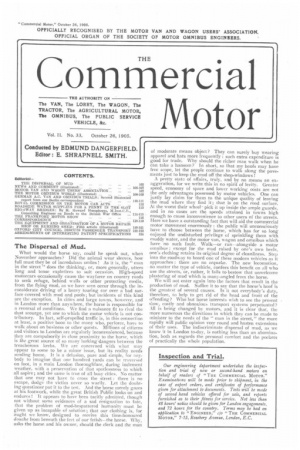The Dispersal of Mud.
Page 1

If you've noticed an error in this article please click here to report it so we can fix it.
What would the horse say, could he speak out, when November approaches? Did the animal wear sleeves, how full must they be of incredulous smiles! As it is, the " man in the street " does the thinking, or, more generally, utters long and tense expletives to suit occasion. High-speed motorcars occasionally cause the wayfarer on country roads to seek refuge, behind walls or other protecting media, from the flying mud, as we have seen occur through the Inconsiderate driving of a heavy touring car over a bad surface covered with mud and pools; but incidents of this kind are the exception. In cities and large towns, however, and in London more than anywhere, the horse is responsible for a reversal of conditions. We find a nuisance fit to rival the dust scourge, yet one to which the motor vehicle is not contributory. In fact, self-propelled traffic is, in this connection at least, a positive boon to the many who, perforce, have to walk about on business or other quests. Millions of citizens and visitors to London are regularly inconvenienced, because they are compulsorily in close proximity to the horse, which is the great source of so many lurking dangers between the treacherous kerbs. We are concerned with what may appear to some to be a minor issue, but its reality needs sending home. It is a delusion, pure and simple, for anybody to imagine that one hundred yards can be traversed on foot, in a main London thoroughfare, during inclement weather, with a preservation of that spotlessness to which all aspire; and the same is true of all busy cities. No matter that one may not have to cross the street : there is no escape, dodge the victim never so warily. Let the doubting questioner put it to the test. And the horse merely gazes at his footwork, while the great British Public looks on and endures I It appears to have been tacitly admitted, though not without some evidences of a sad resignation to fate, that the problem of mud-bespattered humanity must be given up as incapable of solution; that our clothing is, for aught we know, designed to receive this time-honoured douche front beneath the feet of our fetish—the horse. Why, asks the horse and his owner, should the clerk and the man
of moderate means object? They can surely buy wearing apparel and hats more frequently : such extra expenditure is good for trade. Why should the richer man walk when he can take a hansom? In short, so that my hoofs may have free scope, let the people continue to walk along the pavements just to keep the mud off the shop-windows ! A pretty state of affairs, truly, and by no means an exaggeration, for we write this in no spirit of levity. Greater speed, economy of space and lower working costs are not the only advantages possessed by motor vehicles. One can justly lay claim for them to the unique quality of leaving the mud where they find it; that is on the road surface. Al the worst their wheelpick it up inside the ample guards, and in no cases are the speeds attained in towns high enough to cause inconvenience to other users of the streets. Here we have a outstanding fact that will aid the commercial motor movement enormously : the public will unconsciously have to choose between the horse, which has for so long enjoyed the undisturbed privilege of sprinkling them with muddy water, and the motor van, wagon and omnibus which have no such fault. Walk—or run—alongside a motor omnibus : except for the mud raised by one's own heels, one's clothing retains its original degree of cleanliness. Step into the roadway to board one of these modern vehicles as it approaches : there are no sequelee. The new locomotion, no matter the type of vehicle, confers this benefit on all who use the streets, or, rather, it fails to bestow that unwelcome plastering of mud which is many-angled from the horse. We will not enter again into the factors that result in the production of mud. Suffice it to say that the horse's 11001 15 the greatest of several causes. Is it not everybody's duty, therefore, to help to get rid of the head and front of the offending? Who but horse interests wish to see the present slow, costly and obnoxious transport systems perpetuated? All is being changed by motors, and it is clear that, the more numerous the directions in which they can be made to minister to the needs of the " man in the street," the more rapidly will public opinion veer round and hasten extensions of their uses. The indiscriminate dispersal of mud, as we know it in London to-day, is nothing less than an abomination, both as regards the, personal comfort and the pockets of practically the whole population.




















